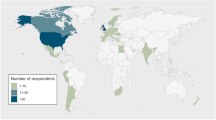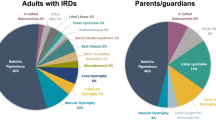Abstract
The decision for genetic testing in children is usually taken by their parents or caregivers, and may be influenced by sociocultural and ethical concerns. This study evaluateds the perspectives of Nigerian parents towards genetic testing of their children with genetic eye diseases parental willingness for genetic testing in their children, and its determinants, in a hospital setting in Nigeria. This cross-sectional, hospital-based study was conducted at the Eye clinic, University College Hospital, Ibadan. The participants were 42 parents of children with genetic eye diseases purposively recruited from April to July 2021. The main variables of interest were overall willingness to test, and willingness to test given ten different scenarios. Summary statistics were performed, and determinants of willingness to test (parental sociodemographic and children’s clinical characteristics) were assessed using Fischer’s exact test. All the participants expressed willingness to test when presented with six of the ten scenarios.However, slightly fewer (83–95%) proportions were willing to test for the other four scenarios (out-of-pocket payment, if test will reveal a systemic association, if test may confirm a diagnosis with no current treatment, and prenatal testing). Willingness to test was not significantly associated with the determinants tested. Thirty-nine (93%) would join a support group, 38 (91%) would inform a family member at risk, and 28 (67%) would be unwilling to have more children if there wais a risk to future offspring. This study demonstrated a high degree of parental willingness for genetic testing of their children. This is important evidence that can guide policy and planning of ophthalmic genetics services.

Similar content being viewed by others
References
Adekanbi AOA, Olayemi OO, Fawole AO (2014) Acceptance of prenatal diagnosis. Afr J Reprod Health 18(1):127–132
Adekoya BJ, Balogun MM, Balogun BG, Ngwu RA (2015) Spectrum of congenital defects of the eye and its adnexia in the pediatric age group; experience at a tertiary facility in Nigeria. Int Ophthalmol 35(3):311–317. https://doi.org/10.1007/s10792-014-9946-4
Adio A, Nwachukwu H (2016) Comprehensive management of pediatric cataract in Africa. Niger J Ophthalmol 24(1):1–11. https://doi.org/10.4103/0189-9171.179918
Aldawalibi BA, Tabbara KF (2019) Causes of childhood blindness at a tertiary eye care facility in Saudi Arabia. Invest Ophthalmol Vis Sci 60(9):3132–3132
Ballantyne A, Goold I, Pearn A, WHO Human Genetics Programme (2006) Medical genetic services in developing countries: the ethical, legal and social implications of genetic testing and screening. World Health Organization. https://apps.who.int/iris/handle/10665/43288
Black GC, Sergouniotis P, Sodi A, Leroy BP, Van Cauwenbergh C, Liskova P, Grønskov K, Klett A, Kohl S, Taurina G, Sukys M, Haer-Wigman L, Nowomiejska K, Marques JP, Leroux D, Cremers FPM, De Baere E, Dollfus H (2021) The need for widely available genomic testing in rare eye diseases: an ERN-EYE position statement. Orphanet J Rare Dis 16(1):1–8. https://doi.org/10.1186/S13023-021-01756-X
Blain D, Brooks BP (2007) Molecular diagnosis and genetic counseling in ophthalmology. Arch Ophthalmol 125(2):196–203. https://doi.org/10.1001/archopht.125.2.196
Botkin JR, Belmont JW, Berg JS, Berkman BE, Bombard Y, Holm IA, Levy HP, Ormond KE, Saal HM, Spinner NB, Wilfond BS, McInerney JD (2015) Points to consider: ethical, legal, and psychosocial implications of genetic testing in children and adolescents. Am J Hum Genet 97(1):6–21. https://doi.org/10.1016/J.AJHG.2015.05.022
Clarke AJ, Wallgren-Pettersson C (2019) Ethics in genetic counselling. J Community Genet 10(1):3–33. https://doi.org/10.1007/s12687-018-0371-7
Dive L, Newson AJ (2021) Ethics of reproductive genetic carrier screening: from the clinic to the population. Public Health Ethics 14(2):202–217. https://doi.org/10.1093/phe/phab017
Ezinne NE, Nnadi CJ, Mashige KP, Onoikhua EE (2018) Causes of childhood blindness among children seen at the National Eye Centre, Kaduna, Nigeria. J Ophthalmol Clin Res 5(1):1–5. https://doi.org/10.24966/OCR-8887/100039
Fagbemiro L, Adebamowo C (2014) Knowledge and attitudes to personal genomics testing for complex diseases among Nigerians. BMC Med Ethics 15:34. https://doi.org/10.1186/1472-6939-15-34
Gallo AM, Angst DB, Knafl KA (2009) Disclosure of genetic information within families: how nurses can facilitate family communication. Am J Nurs 109(4):65–69. https://doi.org/10.1097/01.NAJ.0000348607.31983.6E
Kelly SE (2009) Choosing not to choose: reproductive responses of parents of children with genetic conditions or impairments. Sociol Health Illn 31(1):81–97. https://doi.org/10.1111/j.1467-9566.2008.01110.x
Lenassi E, Clayton-Smith J, Douzgou S, Ramsden SC, Ingram S, Hall G, Hardcastle CL, Fletcher TA, Taylor RL, Ellingford JM, Newman WD, Fenerty C, Sharma V, Lloyd IC, Biswas S, Ashworth JL, Black GC, Sergouniotis PI (2020) Clinical utility of genetic testing in 201 preschool children with inherited eye disorders. Genet Med 22(4):745–751. https://doi.org/10.1038/s41436-019-0722-8
Li Y, Yan J, Wang Z, Huang W, Huang S, Jin L, Zheng Y, Tan X, Yi J, Yip J, Xiao B (2019) Prevalence and causes of childhood blindness in Huidong County, South China, primary ascertained by the key informants. BMJ Open Ophthalmol 4(1):e000240. https://doi.org/10.1136/BMJOPHTH-2018-000240
Lim Q, Mcgill BC, Quinn VF, Tucker KM, Patenaude DMAF, Warby M, Cohn RJ, Wakefield CE (2017) Parents ’ attitudes toward genetic testing of children for health conditions : a systematic review. Clin Genet 92(November 2016):569–578. https://doi.org/10.1111/cge.12989
MedlinePlus. What is the cost of genetic testing, and how long does it take to get the results? Retrieved September 28, 2021, from https://medlineplus.gov/genetics/understanding/testing/costresults/. Accessed 28 Sept 2021
Méjécase C, Malka S, Guan Z, Slater A, Arno G, Moosajee M (2020) Practical guide to genetic screening for inherited eye diseases. Ther Adv Ophthalmol 12:1–28. https://doi.org/10.1177/2515841420954592
Musa KO, Agboola SA, Sam-Oyerinde OA, Salako ST, Kuku CN, Uzoma CJ (2021) Pattern of congenital ocular anomalies among children seen at a West African tertiary eye care centre: a retrospective study. J Clin Sci 18(3):128–132. https://doi.org/10.4103/JCLS.JCLS_48_20
National Population Commission (NPC) [Nigeria] and IFC (2019) Nigeria Demographic and Health Survey 2018. www.DHSprogram.com. Accessed 25 June 2023
Ogamba CF, Roberts AA, Balogun MR, Ikwuegbuenyi CA (2018) Genetic diseases and prenatal genetic testing: knowledge gaps, determinants of uptake and termination of pregnancies among antenatal clinic attendees in Lagos, Southwest Nigeria. Ann Med Health Sci Res 8:143–150
Ogundeji YK, Akomolafe B, Ohiri K, Butawa NN (2019) Factors influencing willingness and ability to pay for social health insurance in Nigeria. PLOS One 14(8):e0220558. https://doi.org/10.1371/JOURNAL.PONE.0220558
Okorie C, Olubusola A (2019) Abortion laws in Nigeria: a case for reform. Annu Surv Int Comp Law 23(1):165–192
Olawoye O, Chuka-Okosa C, Akpa O, Realini T, Hauser M, Ashaye A (2021) Eyes of Africa: the genetics of blindness: study design and methodology. BMC Ophthalmol 21(1):1–7. https://doi.org/10.1186/S12886-021-02029-8/PEER-REVIEW
Olawoye O, Salami KK, Azeez A, Adebola P, Sarimiye T, Imaledo J, Realini T, Hauser MA, Ashaye A (2022) The social construction of genomics and genetic analysis in ocular diseases in Ibadan, South-Western Nigeria. PLOS One 17(12):e0278286. https://doi.org/10.1371/JOURNAL.PONE.0278286
Olawoye OO, Fawole O, Ashaye AO, Chan VF, Azuara-Blanco A, Congdon N (2023) Effectiveness of community outreach screening for glaucoma in improving equity and access to eye care in Nigeria. Br J Ophthalmol 107(1):30–36. https://pubmed.ncbi.nlm.nih.gov/34362773/. Accessed 25 June 2023
Olowoyeye AO, Musa KO, Aribaba OT, Onakoya AO, Akinsola FB (2018) Pattern of childhood visual impairment and blindness among students in schools for the visually impaired in Lagos State: an update. Niger Postgrad Med J 25(2):105–111. https://doi.org/10.4103/NPMJ.NPMJ_27_18
Olusanya BA, Ashaye AO, Owoaje ET, Baiyeroju AM, Ajayi BG (2016) Determinants of utilization of eye care services in a rural adult population of a developing country. Middle East Afr J Ophthalmol 23(1):96–103. https://doi.org/10.4103/0974-9233.164621. Accessed 28 Sept 2023
Olusanya B, Ayede A, Olusanya A, Lawal T, Baiyeroju A, Ogunkunle O, Joel-Medewase V, Adebayo B, Akinrinoye O, Ashubu O, Omokhodion S (2017) Ophthalmic congenital anomalies: spectrum and systemic associations in a Nigerian tertiary hospital. Afr J Med Med Sci 46(2):251–258. http://ojshostng.com/index.php/ajmms/article/view/529. Accessed 28 Sept 2021
Opone PO, Kelikwuma KO (2021) Analysing the politics of Nigeria’s 2019 national minimum wage: towards a public policy. Indian J Labour Econ 64(4):1135–1149. https://doi.org/10.1007/s41027-021-00347-5
Plumridge G, Metcalfe A, Coad J, Gill P (2012) The role of support groups in facilitating families in coping with a genetic condition and in discussion of genetic risk information. Health Expect 15(3):255–266. https://doi.org/10.1111/J.1369-7625.2011.00663.X
Rahi JS (2007) Childhood blindness: a UK epidemiological perspective. Eye 21(10):1249–1253. https://doi.org/10.1038/sj.eye.6702837
Severin F, Borry P, Cornel MC, Daniels N, Fellmann F, Victoria Hodgson S, Howard HC, John J, Kääriäinen H, Kayserili H, Kent A, Koerber F, Kristoffersson U, Kroese M, Lewis C, Marckmann G, Meyer P, Pfeufer A, Schmidtke J, … Rogowski WH (2015) Points to consider for prioritizing clinical genetic testing services: a European consensus process oriented at accountability for reasonableness. Eur J Hum Genet 23(6):729–735. https://doi.org/10.1038/ejhg.2014.190
Singh M, Tyagi S (2018) Genes and genetics in eye diseases: a genomic medicine approach for investigating hereditary and inflammatory ocular disorders. Int J Ophthalmol 11(1):117–134
Solebo AL, Teoh L, Rahi J (2017) Epidemiology of blindness in children. Arch Dis Child 102(9):853–857. https://doi.org/10.1136/ARCHDISCHILD-2016-310532
Stone EM (2007) Genetic testing for inherited eye disease. Arch Ophthalmol 125(2):205–212. https://doi.org/10.1001/archopht.125.2.205
Stone EM, Aldave AJ, Drack AV, MacCumber MW, Sheffield VC, Traboulsi E, Weleber RG (2014) Recommendations of the american academy of ophthalmology task force on genetic testing. american academy of ophthalmology. https://www.aao.org/clinical-statement/recommendations-genetic-testing-of-inherited-eye-d. Accessed 20 May 2020
Taylan Şekeroğlu H, Utine GE, Alikaşifoğlu M (2016) A baseline algorithm for molecular diagnosis of genetic eye diseases: ophthalmologist’s perspective. Turk J Ophthalmol 46(6):299–300. https://doi.org/10.4274/tjo.59375
Tubeuf S, Willis TA, Potrata B, Grant H, Allsop MJ, Ahmed M, Hewison J, McKibbin M (2015) Willingness to pay for genetic testing for inherited retinal disease. Eur J Hum Genet 23(3):285–291. https://doi.org/10.1038/EJHG.2014.111
Wadhwani M, Vashist P, Singh S, Gupta V, Gupta N, Saxena R (2020) Prevalence and causes of childhood blindness in India: a systematic review. Indian J Ophthalmol 68(2):311–315. https://doi.org/10.4103/IJO.IJO_2076_18
Willis TA, Potrata B, Ahmed M, Hewison J, Gale R, Downey L, McKibbin M (2013) Understanding of and attitudes to genetic testing for inherited retinal disease: a patient perspective. Br J Ophthalmol 97(9):1148–1154. https://doi.org/10.1136/bjophthalmol-2013-303434
Zhang Y, Wang Z, Huang S, Sun L, Zhao S, Zhong Y, Xiao H, Ding X (2019) Parents’ perceptions of diagnostic genetic testing for children with inherited retinal disease in China. Mol Genet Genomic Med 7(9):e916. https://doi.org/10.1002/mgg3.916
Acknowledgements
OOO and MOU are supported by the Consortium for Advanced Research Training in Africa (CARTA). CARTA is jointly led by the African Population and Health Research Center and the University of the Witwatersrand and funded by the Carnegie Corporation of New York (Grant No. G-19-57145), Sida (Grant No:54100113), Uppsala Monitoring Center, Norwegian Agency for Development Cooperation (Norad), and by the Wellcome Trust [reference no. 107768/Z/15/Z] and the UK Foreign, Commonwealth & Development Office, with support from the Developing Excellence in Leadership, Training and Science in Africa (DELTAS Africa) programme. The statements made and views expressed are solely the responsibility of the Fellows.
Funding
The study questionnaire has been submitted as a supplementary material. The anonymized response data are available upon reasonable request from the corresponding author.
Author information
Authors and Affiliations
Contributions
All authors contributed to the conceptualization and design of the study. HIM collected and analyzed the data, and wrote the first draft. All authors commented on previous versions of the manuscript and reviewed and approved the final manuscript.
Corresponding author
Ethics declarations
Ethics approval
This study was performed in line with the principles of the Declaration of Helsinki. Approval was granted by the Ethics Review Committee of the University College Hospital, Ibadan (UI/EC/20/0368, 2020), and informed consent was obtained from all participants.
Conflict of interest
The authors declare that they have no conflict of interest.
Additional information
Publisher's note
Springer Nature remains neutral with regard to jurisdictional claims in published maps and institutional affiliations.
Supplementary Information
Below is the link to the electronic supplementary material.
Rights and permissions
Springer Nature or its licensor (e.g. a society or other partner) holds exclusive rights to this article under a publishing agreement with the author(s) or other rightsholder(s); author self-archiving of the accepted manuscript version of this article is solely governed by the terms of such publishing agreement and applicable law.
About this article
Cite this article
Monye, H.I., Olawoye, O.O., Ugalahi, M.O. et al. Nigerian parents’ perspectives on genetic testing in their children with genetic eye diseases. J Community Genet 14, 387–394 (2023). https://doi.org/10.1007/s12687-023-00658-8
Received:
Accepted:
Published:
Issue Date:
DOI: https://doi.org/10.1007/s12687-023-00658-8




